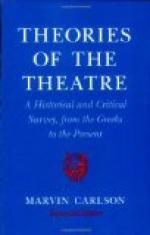A few years ago it was customary for dramatists to end every act with a bang that would reverberate in the ears of the audience throughout the entr’-acte. Recently our playwrights have shown a tendency toward more quiet curtain-falls. The exquisite close of the first act of The Admirable Crichton was merely dreamfully suggestive of the past and future of the action; and the second act ended pictorially, without a word. But whether a curtain-fall gains its effect actively or passively, it should, if possible, sum up the entire dramatic accomplishment of the act that it concludes and foreshadow the subsequent progress of the play.
Likewise, the first moments in an act are of necessity emphatic because they are the first. After an intermission, the audience is prepared to watch with renewed eagerness the resumption of the action. The close of the third act of Beau Brummel makes the audience long expectantly for the opening of the fourth; and whatever the dramatist may do after the raising of the curtain will be emphasised because he does it first. An exception must be made of the opening act of a play. A dramatist seldom sets forth anything of vital importance during the first ten minutes of his piece, because the action is likely to be interrupted by late-comers in the audience and other distractions incident to the early hour. But after an intermission, he is surer of attention, and may thrust important matter into the openings of his acts.
The last position, however, is more potent than the first. It is because of their finality that exit speeches are emphatic. It has become customary in the theatre to applaud a prominent actor nearly every time he leaves the stage; and this custom has made it necessary for the dramatist to precede an exit with some speech or action important enough to justify the interruption. Though Shakespeare and his contemporaries knew nothing of the curtain-fall, they at least understood fully the emphasis of exit speeches. They even tagged them with rhyme to give them greater prominence. An actor likes to take advantage of his last chance to move an audience. When he leaves the stage, he wants at least to be remembered.
In general it may be said that any pause in the action emphasises by position the speech or business that immediately preceded it. This is true not only of the long pause at the end of an act: the point is illustrated just as well by an interruption of the play in mid-career, like Mrs. Fiske’s ominous and oppressive minute of silence in the last act of Hedda Gabler. The employment of pause as an aid to emphasis is of especial importance in the reading of lines.




